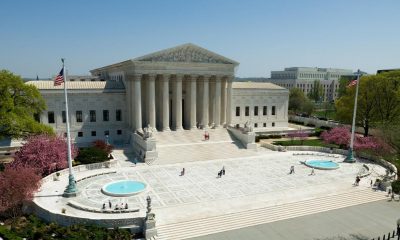U.S. Federal Courts
Justices hear arguments in Texas Abortion Ban- seem skeptical
“If states are permitted to hand over their enforcement authority to private individuals, then no constitutional right is safe”
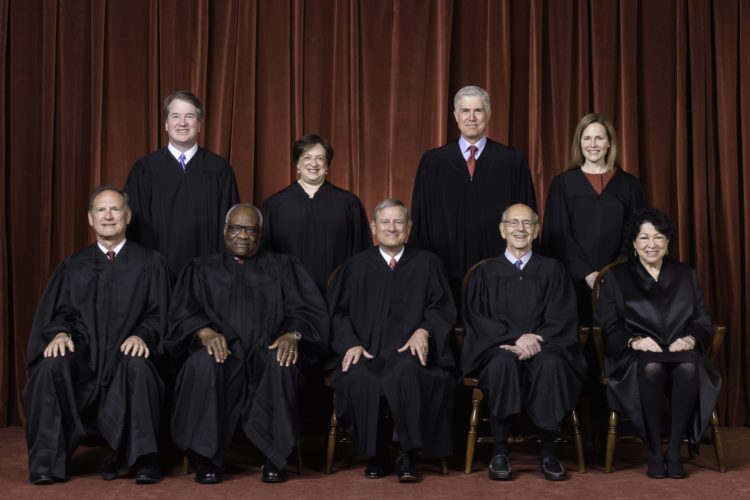
WASHINGTON – The U.S. Supreme Court heard oral arguments Monday over Texas anti-abortion law known as Senate Bill 8, ( S.B. 8. ). After three hours of an animated back and forth between the justices, Texas Solicitor General Judd Stone and the Solicitor General of the United States Elizabeth Prelogar, it appeared that the high court will allow abortion providers to challenge S.B. 8.
Also presenting arguments was Jonathan Mitchell, the attorney who represents individuals who want to bring S.B. 8 lawsuits. Mitchell also happens to be the primary architect behind S.B. 8.
The law went into effect in October and restricts abortions at beyond 6 weeks, a point that most women are not even aware they are pregnant.
The court heard two cases dealing with S.B. 8. The first case was filed by abortion clinics in Texas. At question was whether the state can rely on a private-enforcement structure to insulate the abortion ban from judicial review in federal courts. The second case was filed by the Biden Justice Department. The question in this case is whether the federal government has the ability to sue Texas (or public officials or private parties) to block the abortion law.
Marc Hearron is arguing on behalf of the Texas clinics challenging the law. [Whole Woman’s Health v. Jackson] “At issue here is nothing less than the supremacy of federal law,” he tells the justices.
Associate U.S. Supreme Court Justice Sonia Sotomayor noted that the Texas law has created a dramatic chilling effect on abortion clinics through the potential for exorbitant litigation. “The chilling effect is the multiplicity of lawsuits against you.”
After some back and forth, Associate U.S. Supreme Court Justice Amy Coney Barrett voiced her take suggesting that the way S.B. 8 is written, the clinics cannot fully vindicate their constitutional rights in a state court. “The full constitutional defense cannot be asserted in the defensive posture, am I right?” Barrett queried.
The Justices then focused on the peculiarity in the law’s language allowing private individuals to bring suits.
Associate U.S. Supreme Court Justice Elena Kagan points to the “procedural morass we’ve gotten ourselves into with this extremely unusual law.” And she asks what precise relief the Texas clinics are requesting from the Supreme Court.
Hearron answers Kagan’s question by saying: “We want an injunction preventing Texas courts from docketing any lawsuits brought under the Texas law, and an injunction against state officials preventing them from exercising residual enforcement authority.” This prompts Associate U.S. Supreme Court Neil Gorsuch to ask: “But what about lawsuits brought under the Texas law that wouldn’t violate Roe v. Wade and Planned Parenthood v. Casey? (E.g., lawsuits against post-viability abortions). Should courts be enjoined from docketing even those lawsuits?” Hearron answered in the affirmative.
He then warns the justices that if they permit S.B. 8 to remain in effect, the model could be used to nullify other constitutional rights. “It will provide a roadmap for other states to abrogate other rights that have been recognized by this court.”
Associate U.S. Supreme Court Justice Brett Kavanaugh poses a question as to the potential implications for other rights. “Anyone who sells an AR-15 is liable to any private citizen for a million dollars,” Kavanaugh says. Would such a law be subject to pre-enforcement review?
Texas Solicitor General Judd Stone answered Justice Kavanaugh saying Congress can step in to pass legislation protecting specific rights from being chilled by S.B. 8-style lawsuits. Justice Kagan jumps in: “Isn’t the point of a right that you don’t have to ask Congress?”
The Justices seemed unconvinced with Stone’s analysis at that point. The next case was then brought, United States v. Texas, the Biden administration’s lawsuit against the Texas law. Elizabeth Prelogar, in her first argument as the newly confirmed solicitor general, told the Justices that the Texas law is “an attack on the authority of this court to say what the law is.”
The solicitor general also tells the court that: “The United States may sue to protect the supremacy of federal law against this attack.” Associate U.S. Supreme Court Justice Clarence Thomas asked Prelogar: “Do you have any examples of the national government intervening to protect constitutional rights in this way?”
She responded saying there aren’t any equivalent examples because the Texas law is unprecedented. After Justice Kagan asked how should the court craft relief. Prelogar said the correct relief is what the U.S. District Judge did in this case: issue an injunction against Texas itself. (The 5th Circuit subsequently lifted that injunction.)
Associate U.S. Supreme Court Justice Neil Gorsuch returns to the broad nature of the injunction the federal government is seeking. He says there’s never been such an injunction “in the history of the United States.” Prelogar replied: “In the history of the United States, no state has done what Texas has done here.”
Kagan: If we accept Texas' position, "we would be inviting states, all 50 of them, to try to nullify the law this court has laid down."
— SCOTUSblog (@SCOTUSblog) November 1, 2021
Stone: "The state of Texas has not nullified anything."
The Justices seem again unconvinced on the scope of the federal government’s intervention.
In a return to the enforcement aspects, Jonathan Mitchell, the attorney who represents individuals who want to bring S.B. 8 lawsuits, in response to grilling from Justice Sotomayor, he insists that there is no state action under S.B. 8; it’s enforced solely by private citizens. “The state has passed a law giving them the option to sue, and then washed its hands of the matter.”
The U.S. solicitor general ended wit: “If states are permitted to hand over their enforcement authority to private individuals, “then no constitutional right is safe, no constitutional decision of this court is safe.” “That would be an intolerable state of affairs,” she added.
Neal Katyal, a lawyer admitted to argue before the Supreme Court and a former U.S. Acting Solicitor General noted in a tweet:
Bottom line: both Justices Kavanaugh and Barrett seem skeptical of Texas position. Caveats abound: both Justices ruled FOR Texas 2 months ago. And oral args test the logic of a position and can be misleading. But these two are really sounding skeptical.
— Neal Katyal (@neal_katyal) November 1, 2021
********************
Additional reporting from SCOTUSblog
U.S. Federal Courts
U.S. Supreme Court allows Idaho to enforce gender care ban
SCOTUS sides with state to allow enforcement of gender-affirming care ban for youth. Poe v. Labrador lawsuit remains ongoing.

By Mia Maldonado | WASHINGTON – The U.S. Supreme Court has allowed Idaho to enforce House Bill 71, a law banning Idaho youth from receiving gender-affirming care medications and surgeries.
In an opinion issued Monday, the U.S. Supreme Court granted the state of Idaho’s request to stay the preliminary injunction, which blocked the law from taking effect. This means the preliminary injunction now only applies to the plaintiffs involved in Poe v. Labrador — a lawsuit brought on by the families of two transgender teens in Idaho who seek gender-affirming care.
Monday’s U.S. Supreme Court decision enforces the gender-affirming care ban for all other transgender youth in Idaho as the lawsuit remains ongoing in the Ninth Circuit Court of Appeals.

The American Civil Liberties Union and the ACLU of Idaho, both of whom represent the plaintiffs, said in a press release Monday that the ruling “does not touch upon the constitutionality” of House Bill 71. The groups called Monday’s ruling an “awful result” for transgender Idaho youth and their families.
“Today’s ruling allows the state to shut down the care that thousands of families rely on while sowing further confusion and disruption,” the organizations said in the press release. “Nonetheless, today’s result only leaves us all the more determined to defeat this law in the courts entirely, making Idaho a safer state to raise every family.”
Idaho Attorney General Raúl Labrador in a press release said the state has a duty to protect and support all children, and that he is proud of the state’s legal stance.
“Those suffering from gender dysphoria deserve love, support and medical care rooted in biological reality,” Labrador said. “Denying the basic truth that boys and girls are biologically different hurts our kids. No one has the right to harm children, and I’m grateful that we, as the state, have the power — and duty — to protect them.”
Recap of Idaho’s House Bill 71, and what led to SCOTUS opinion
Monday’s Supreme Court decision traces back to when House Bill 71 was signed into law in April 2023.
The law makes it a felony punishable for up to 10 years for doctors to provide surgeries, puberty-blockers and hormones to transgender people under the age of 18. However, gender-affirming surgeries are not and were not performed among Idaho adults or youth before the bill was signed into law, the Idaho Capital Sun previously reported.
One month after it was signed into law, the families of two transgender teens sued the state in a lawsuit alleging the bill violates the 14th Amendment’s guarantee of equal protection under the law.
In late December, just days before the law was set to take effect in the New Year, District of Idaho Judge B. Lynn Winmill blocked the law from taking effect under a preliminary injunction. In his decision, he said he found the families likely to succeed in their challenge.
The state of Idaho responded by appealing the district court’s preliminary injunction decision to the Ninth Circuit, to which the Ninth Circuit denied. The state of Idaho argued the court should at least enforce the ban for everyone except for the plaintiffs.
After the Ninth Circuit’s denial, the Idaho Attorney General’s Office in February sent an emergency motion to the U.S. Supreme Court, the Idaho Press reported. Monday’s U.S. Supreme Court decision agrees with the state’s request to enforce its ban on transgender health care for minors, except for the two plaintiffs.
******************************************************************************************

Mia Maldonado joined the Idaho Capital Sun after working as a breaking news reporter at the Idaho Statesman covering stories related to crime, education, growth and politics. She previously interned at the Idaho Capital Sun through the Voces Internship of Idaho, an equity-driven program for young Latinos to work in Idaho news. Born and raised in Coeur d’Alene, Mia moved to the Treasure Valley for college where she graduated from the College of Idaho with a bachelor’s degree in Spanish and international political economy.
******************************************************************************************
The preceding piece was previously published by the Idaho Capital Sun and is republished with permission.
The Idaho Capital Sun is the Gem State’s newest nonprofit news organization delivering accountability journalism on state politics, health care, tax policy, the environment and more.
We’re part of States Newsroom, the nation’s largest state-focused nonprofit news organization.
U.S. Federal Courts
Federal appeals court hears oral arguments in SAFE Act appeal
As of last November, similar laws had been enacted in 22 states, and legal challenges have been mounted in several of them
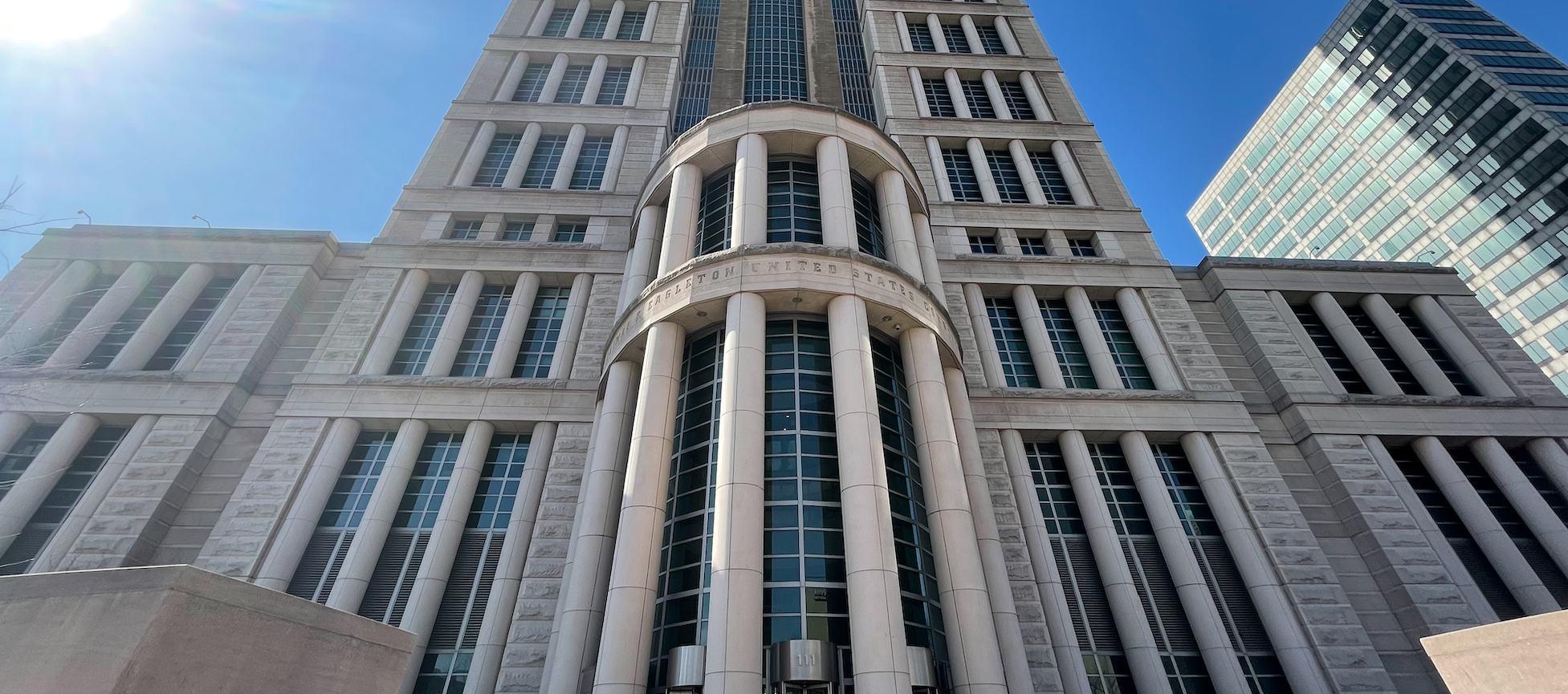
By Debra Chandler Landis | SAINT LOUIS, Mo. – Federal appeals court judges here on Thursday heard legal counsel for the national ACLU and the U.S. Department of Justice argue that transgender minors have a constitutional right to gender-affirming care, while Arkansas’ deputy solicitor general said a state law prohibiting such care was in the best interest of youth and not discriminatory.
At issue is the 2021 Save Adolescents from Experimentation (SAFE) Act, which bans physicians from providing gender transition treatments like hormones, puberty blockers and sex reassignment surgeries to individuals under age 18.
Four Arkansas families and two physicians, represented by the American Civil Liberties Union of Arkansas, challenged the SAFE Act in federal court, where U.S. District Judge James Moody struck down the law in June 2023, saying, among other things, that the SAFE Act discriminated against transgender people and violated the U.S. Constitution’s First and Fourteenth Amendments.

Arkansas Attorney General Tim Griffin appealed that decision in July 2023 to the 8th U.S. Circuit Court of Appeals. The state has argued there is no scientific evidence that children benefit from gender-affirming care and that the consequences can be harmful and often permanent for them.
Asked by the appeals judges whether the state law would ban health care providers from prescribing testosterone for conditions other than gender-affirming care treatment, Dylan Jacobs, Arkansas deputy solicitor general, said, “The statute does not prohibit that. The legislature wasn’t saying it has problems with testosterone.”
Regarding the district court’s ruling to strike down the ban on transgender care in Arkansas, Jacobs said “there are certainly risks, including sterilization” in the treatment, and noted it was not up to the district court to impose its own policy judgments.
ACLU attorney Chase Strangio, deputy director for the organization’s LGBTQ & HIV Project, told the appeals court Thursday they should uphold Moody’s ruling, noting, in part, that the state law undermines constitutional guarantees of equal protection and “supplants the judgment of parents and their abilities to determine medical care.”
Griffin has said his office “is fighting to protect our state’s children from dangerous medical experimentation. Moody, in his 80-page ruling striking the Arkansas law, affirmed the testimony of medical experts who said in their testimony for the plaintiffs that gender-affirming care is safe for minors.
The State of Arkansas, Moody wrote, “failed to prove that its interests in the safety of Arkansas adolescents from gender transitioning procedures or the medical community’s ethical decline are compelling, genuine, or even rational.”
In 2021, a letter from the American Medical Association to the National Governors Association referenced the Arkansas SAFE Act and said, in part: “Arkansas recently enacted SAFE Act and similar bills pending in several other states would insert the government into clinical decision-making and force physicians to disregard clinical guidelines.”
Gender-affirming care for minors, the AMA said, “must be sensitive to the child’s clinical situation, nurture the child’s short and long-term development, and balance the need to preserve the child’s opportunity to make important life choices autonomously in the future.”
The 8th Circuit Court of Appeals did not indicate when it might rule on the Arkansas law.
As of last November, similar laws had been enacted in 22 states, and legal challenges have been mounted in several of them. The U.S. Supreme Court has not yet taken up any of those cases.
******************************************************************************************

Debra Chandler Landis is a freelance journalist and retired University of Illinois Springfield college media adviser. She currently lives in St. Louis.
******************************************************************************************
The preceding article was previously published by The Arkansas Advocate and is republished with permission.
The Arkansas Advocate is a nonprofit, nonpartisan news organization dedicated to tough, fair daily reporting and investigative journalism that holds public officials accountable and focuses on the relationship between the lives of Arkansans and public policy. This service is free to readers and other news outlets.
We’re part of States Newsroom, the nation’s largest state-focused nonprofit news organization.
U.S. Federal Courts
Federal judge tosses a NY county’s suit defending trans sports ban
Bills banning trans youth from participating in sports already have passed in 24 states, although some have been blocked by active lawsuits

BROOKLYN, N.Y. – A U.S. District Court judge ruled Friday against a pre-emptive lawsuit from Nassau County Executive Bruce Blakeman fighting off an attempt by New York Attorney General Letitia James to litigate his transphobic executive order barring the county’s Department of Parks, Recreation, and Museums from issuing permits to any women’s or girls’ sports team with transgender players.
“This decision is a tremendous victory for justice and the rule of law, but our work here is not done,” said Alexis Richards, a spokesperson for the Attorney General. “It’s past time for Nassau County to rescind this [executive] order and treat all our communities with the basic respect and dignity they deserve.”
Earlier this month U.S. District Court Judge Nusrat Choudhury, who is on the bench of the U.S. District Court for the Eastern District of New York, denied Blakeman’s request for a temporary restraining order against the Attorney General.
In that ruling Judge Choudhury wrote that the Long Island county “falls far short of meeting the high bar for securing the extraordinary relief,” the Associated Press reported.
Among other things, Choudhury said the county failed to “demonstrate irreparable harm,” which she said was a “critical prerequisite” for such an order.
The ruling, however, doesn’t address the legality of the county’s ban or James’ request that the lawsuit be dismissed. Those issues will be decided at a later date, the Associated Press noted.
Reacting to today’s ruling in a statement released to the media Blakeman said: “We vehemently disagree with the decision and will appeal.”
On March 1st, Attorney General James sent a order of cease and desist to Blakeman demanding that the Republican Nassau County Executive rescind his February 22 directive within five days or else face additional legal actions.
“The law is perfectly clear: you cannot discriminate against a person because of their gender identity or expression. We have no room for hate or bigotry in New York,” the Attorney General wrote. “This executive order is transphobic and blatantly illegal. Nassau County must immediately rescind the order, or we will not hesitate to take decisive legal action.”
Last month the Nassau County Executive announced he was filing a lawsuit over the Attorney General’s actions.
Last month on March 11, the New York Civil Liberties Union (NYCLU) filed a separate lawsuit against the Nassau County Executive. The lawsuit argues that the policy violates New York’s Human Rights Law and Civil Rights Law, which explicitly prohibit discrimination based on gender identity following passage of New York’s Gender Expression Non-Discrimination Act (GENDA).
“Trans people who play sports need support and affirmation, not to be a political target. Nassau County’s cynical attempt to shut them out of public spaces is a blatant violation of our state’s civil and human rights laws. It also speaks to growing, nationwide attacks against LGBTQ+ rights, and we won’t stand for this hatred here in New York,” said Gabriella Larios, staff attorney at the New York Civil Liberties Union. “As promised the day this executive order was issued, we’re taking action so that the courts relegate this harmful, transphobic policy to the dustbin of history, where it belongs.”
The ban will remain in effect as the litigation proceeds or it is enjoined by a judge.
U.S. Federal Courts
Federal judge tosses suit against Calif. trans sanctuary state law
The law provides legal protections for families who come to Calif. to obtain gender-affirming care that is inaccessible where they live
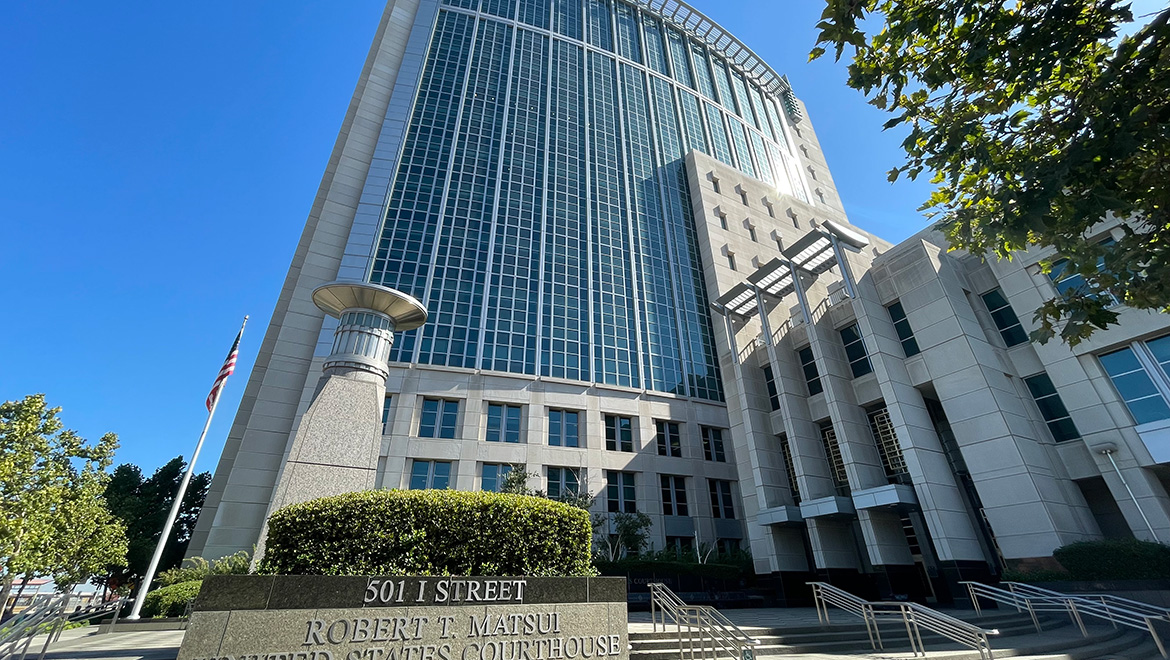
SACRAMENTO, Calif. — A judge of the United States District Court for the Eastern District of California dismissed a second amended complaint challenging the constitutionality of Senate Bill 107 (SB 107), also referred to as California’s Transgender Sanctuary State Law.
In the dismissal without leave to amend, the court dismissed the lawsuit on Article III standing grounds, finding that the plaintiff failed to allege that SB 107 injured them in any way, and failed to allege any facts showing that SB 107 forced the plaintiff to divert staff time and resources.
SB 107 protects children and families seeking gender affirming care, as well as their health care providers, from bigoted anti-trans laws in other states that criminalize medically necessary health care that is legal in California.
The Transgender Sanctuary State Law provides legal protections for families who come to California to obtain gender-affirming care that is inaccessible where they live, as well as doctors and staff providing such care in California. It implements various safeguards against the enforcement of other states’ laws that would penalize people for obtaining medically necessary care that is legal in California.
California Attorney General Rob Bonta issued a statement following the U.S. District Court’s order granting the California Department of Justice’s motion to dismiss the second amended complaint challenging the constitutionality of Senate Bill 107 (SB 107).
“No one should ever be marginalized for seeking the care they need,” said Bonta. “The court’s decision is a major win for transgender children and their families in California and across the U.S. amidst a growing assault on LGBTQ+ rights nationwide. My office stands ready to defend SB 107 to ensure transgender and gender-nonconforming individuals obtain the care that empowers them to lead healthier, happier lives.”
“Transgender people just want to live their lives authentically and in peace, and California is defending their right to do so,” said the law’s author, state Senator Scott Wiener. “This ruling shows once again that trans people are living authentically in California without any of the negative impacts on those around them of which right-wing zealots accuse them. California’s leadership is united in defending transgender people, and LGBTQ people generally, from the vicious attacks they face in other states. I thank Attorney General Bonta and his team for their incredible work securing this major civil rights victory.”
U.S. Federal Courts
Federal judge rules Florida trans teacher can use ‘Ms.’ in classroom
“Once again, the State of Florida has a First Amendment problem. It has occurred so frequently of late, you can set your clock by it”
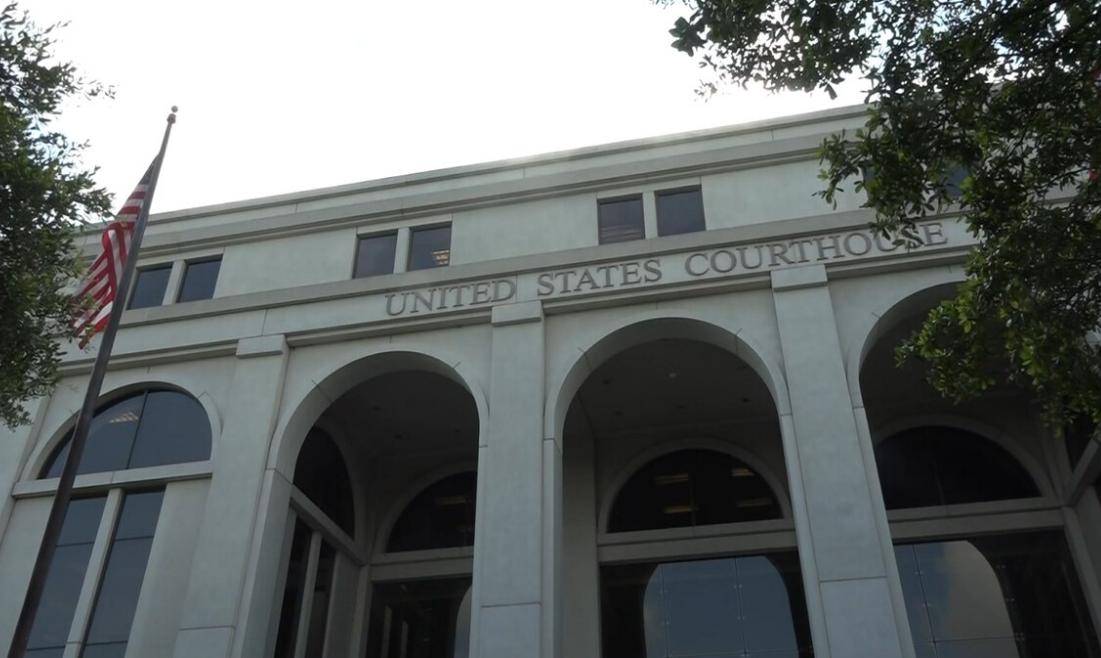
By Erin Reed | TALLAHASSEE, Fla. – In Florida, a federal judge ruled that a transgender woman teacher no longer has to be referred to as “Mr.” or “teacher” in the classroom, citing first amendment protections.
Instead, she can use “Ms.” and female pronouns. This decision follows the passage of HB1069 in Florida, which mandated that teachers could not use pronouns that “do not correspond to his or her sex.”
U.S. District Court Judge Mark Walker enjoined the state from enforcing the law against her, stating, “The State of Florida has not justified this grave restraint, and so the United States Constitution does not tolerate it. Ours is a Union of individuals, celebrating ourselves and singing ourselves and being ourselves without apology.”
The plaintiff, Ms. Wood, a teacher at a Florida high school, has been known as “Ms. Wood” for four years. She regularly would write her name, title, and pronouns on the whiteboard and used these pronouns with students, faculty, and staff, as well as in her personal life. In evaluating Ms. Wood’s usage of her name, title, and pronouns, the judge determined that “The freedom to use the title ‘Ms.’ and to share her preferred pronouns at school is essential to her basic humanity.”
Ms. Wood’s ability to use her preferred title and pronouns was threatened following the passage of House Bill 1069. Enacted into law in 2023, House Bill 1069 prohibits all employees and contractors of public K-12 educational institutions from using their preferred personal titles or pronouns if those “do not correspond to their sex.”
After the law’s enactment, administrators informed Ms. Wood that she had to remove her pronouns and title from display and could not correct students who referred to her as “Mr.” or “him.”
The judge commenced his ruling with a scathing critique of the state, writing, “Once again, the State of Florida has a First Amendment problem. It has occurred so frequently of late, some might say you can set your clock by it… The question before this Court is whether the First Amendment allows the State to dictate, without limitation, how public-school teachers refer to themselves when communicating with students. The answer is a thunderous ‘no.’”
The judge ultimately determined that prohibiting Ms. Wood from using her pronouns or title constituted an unconstitutional violation of her freedom of speech, deeming it a form of viewpoint discrimination.
In his decision, he refuted several arguments presented by the state, including the claim that Ms. Wood using “Ms.” could “impede her job duties.” He found this assertion to be unfounded, noting instead that as a teacher, Ms. Wood’s students achieved test scores higher than the district average.
Additionally, the state argued that Ms. Wood’s identity itself was at odds with the state’s teachings on gender and sexuality, and thus she could be barred. This argument, based on a novel legal theory, was found by the judge to be entirely unsupported by court precedent.
This case is not the only recent legal action addressing this topic. Two weeks prior, the 11th Circuit Court of Appeals ruled that repeated and intentional misgendering could constitute a hostile work environment. Similarly, the 7th Circuit Court of Appeals determined that teachers do not have the religious right to misgender transgender students. While the Florida case did not grant Ms. Wood an injunction on the basis of a hostile work environment, it does not preclude the possibility that it might recognize she experienced such an environment in addition to the First Amendment violation identified by the judge when the case is fully heard.
It is important to note that although defendants are barred from enforcing the law against Ms. Wood, the injunction is currently limited only to the teacher. However, should other teachers be threatened with retaliation under similar circumstances, it is likely they would also prevail. Similarly, this case will likely be cited in other attempts to bar transgender students and teachers from using their pronouns in school settings nationwide.
****************************************************************************

Erin Reed is a transgender woman (she/her pronouns) and researcher who tracks anti-LGBTQ+ legislation around the world and helps people become better advocates for their queer family, friends, colleagues, and community. Reed also is a social media consultant and public speaker.
******************************************************************************************
The preceding article was first published at Erin In The Morning and is republished with permission.
U.S. Federal Courts
Federal judge: NY AG can continue legal action on anti-trans order
U.S. District Court Judge Choudhury denied Nassau County Executive Bruce Blakeman’s request for a temporary restraining order
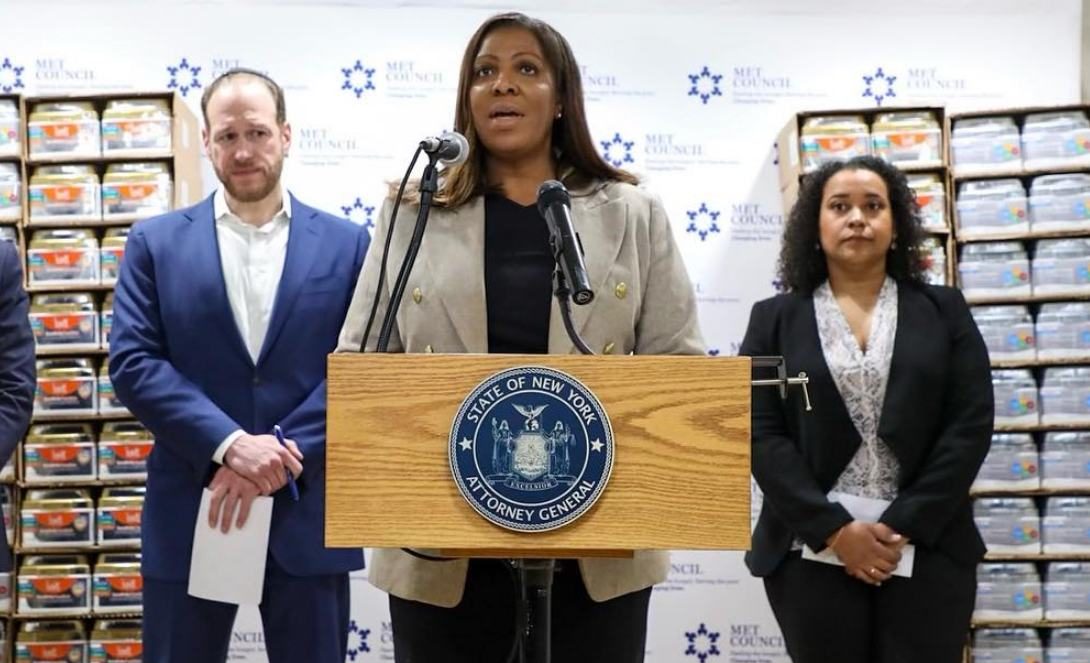
BROOKLYN, N.Y. – A U.S. District Court judge ruled Thursday that New York Attorney General Letitia James can continue to take legal action against Nassau County over a transphobic executive order barring the Nassau County Department of Parks, Recreation, and Museums from issuing permits to any women’s or girls’ sports team with transgender players.
U.S. District Court Judge Nusrat Choudhury, who is on the bench of the U.S. District Court for the Eastern District of New York, denied Nassau County Executive Bruce Blakeman’s request for a temporary restraining order against the Attorney General.
In his ruling Judge Choudhury wrote that the Long Island county “falls far short of meeting the high bar for securing the extraordinary relief,” the Associated Press reported.
Among other things, Choudhury said the county failed to “demonstrate irreparable harm,” which she said was a “critical prerequisite” for such an order.
The ruling, however, doesn’t address the legality of the county’s ban or James’ request that the lawsuit be dismissed. Those issues will be decided at a later date, the Associated Press noted.
On March 1st, Attorney General James sent a order of cease and desist to Blakeman demanding that the Republican Nassau County Executive rescind his February 22 directive within five days or else face additional legal actions.
“The law is perfectly clear: you cannot discriminate against a person because of their gender identity or expression. We have no room for hate or bigotry in New York,” the Attorney General wrote. “This executive order is transphobic and blatantly illegal. Nassau County must immediately rescind the order, or we will not hesitate to take decisive legal action.”
Last month the Nassau County Executive announced he was filing a lawsuit over the Attorney General’s actions.
In his filing in the U.S. District Court for the Eastern District of New York, the Nassau County Executive argues that New York State Human Rights Law does not extend to transgender people. The suit also cites the 14th Amendment claiming the “cease and desist” letter issued by the Attorney General violates the U.S. Constitution’s “equal protection” clause, which is enshrined in the 14th Amendment.
According to the Office of the Attorney General: “Under New York law, it is illegal to discriminate against an individual based on their sex or gender identity or expression. In addition to violating basic civil and human rights, the executive order will impose undue increased scrutiny on women’s and girls’ teams and leagues and will also subject all athletes on women’s and girls’ sports teams to intrusive and invasive questioning and other verification requirements.”
Blakeman told reporters: “We don’t want 6-foot, 210-pound males competing against women and girls who are not that big, they’re not that strong. That’s an unfair competition. It’s dangerous. And we also don’t want biological males in the same locker rooms as biological females.”
When pressed by journalists Blakeman could not cite an instance of a transgender athlete trying to play on a female team in the Long Island county, instead referencing controversy other transgender athletes in other states and “interest” from constituents. He has insisted he is being proactive to prevent it from happening, WNBC 4 News reported.
“We’re taking action now because it’s happening around the country and we don’t want it to happen here,” he said. He argued the Attorney General’s actions to force him to rescind his order denies “biological females’ right to equal opportunities in athletics” as well as their “right to a safe playing field” by exposing them to increased risk of injury if they’re forced to compete against transgender women.
In a press release the James’ office noted: The executive order forces sports teams and leagues to make an unfair and unnecessary choice: openly discriminate against transgender women and girls in violation of state law, or find somewhere else to play. The executive order applies to more than 100 venues, including general playing fields in parks, baseball, football, and soccer fields, basketball and tennis courts, indoor and outdoor swimming pools, and ice rinks. This discriminatory order will not only impact Nassau County-based teams and leagues but will also undoubtedly deter teams from other counties from participating in Nassau County games and sporting events.
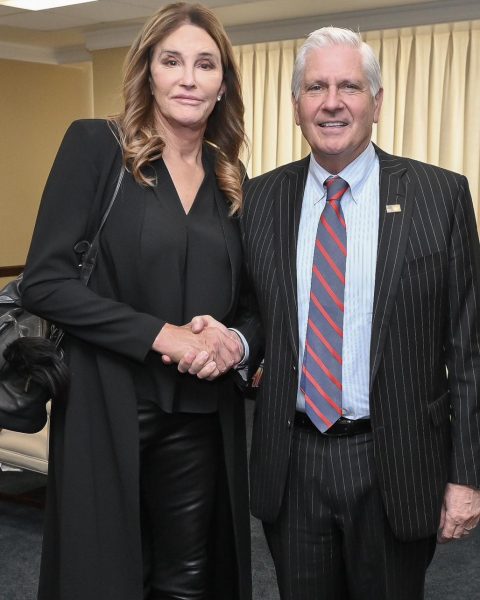
(Photo Credit: Blakeman Official Nassau County/Facebook)
David Kilmnick, PhD, a leading advocate within New York’s LGBTQ+ communities and the founder and President/CEO of the New York LGBT Network referred to Blakeman’s executive order as “just a complete waste of time and a political stunt.” In an interview with WNBC 4 Kilmnick called Blakeman’s actions illegal and dangerous. “We need to get real here: The bullying that is taking place is on trans youth.”
At a news conference carried live by Fox News Channel on March 18, Caitlyn Jenner at Blakeman’s request flew from her home in Malibu, Calif. to join with him and other elected Republican leaders to speak in support of his February executive order banning trans athletes at more than 100 county-owned facilities. “Trans women are competing against women, taking valuable opportunities for the long-protected class under Title IX and causing physical harm,” said Jenner without providing supportive evidence of her claim. Jenner said the ban would defeat “the woke agenda.”
Her comments drew praise from former NCAA swimmer and paid shill Riley Gaines, who represents the Independent Women’s Forum and has also worked with the failed presidential campaign of Gov. Ron DeSantis of Florida on his anti-trans athlete platform.
“If the left wants to fight this battle on this hill, it’s a losing battle,” said Jenner. “We will win the battle.” She claimed she spoke on behalf of women and girls, contradicting her past statements in support of trans girls competing according to their gender identity and despite the fact she herself still competes in women’s sports.
U.S. Federal Courts
Far-right Gays Against Groomers, others sue Colorado lawmakers
Gays Against Groomers has established itself as one of the most notable propagators of anti-trans rhetoric across the nation
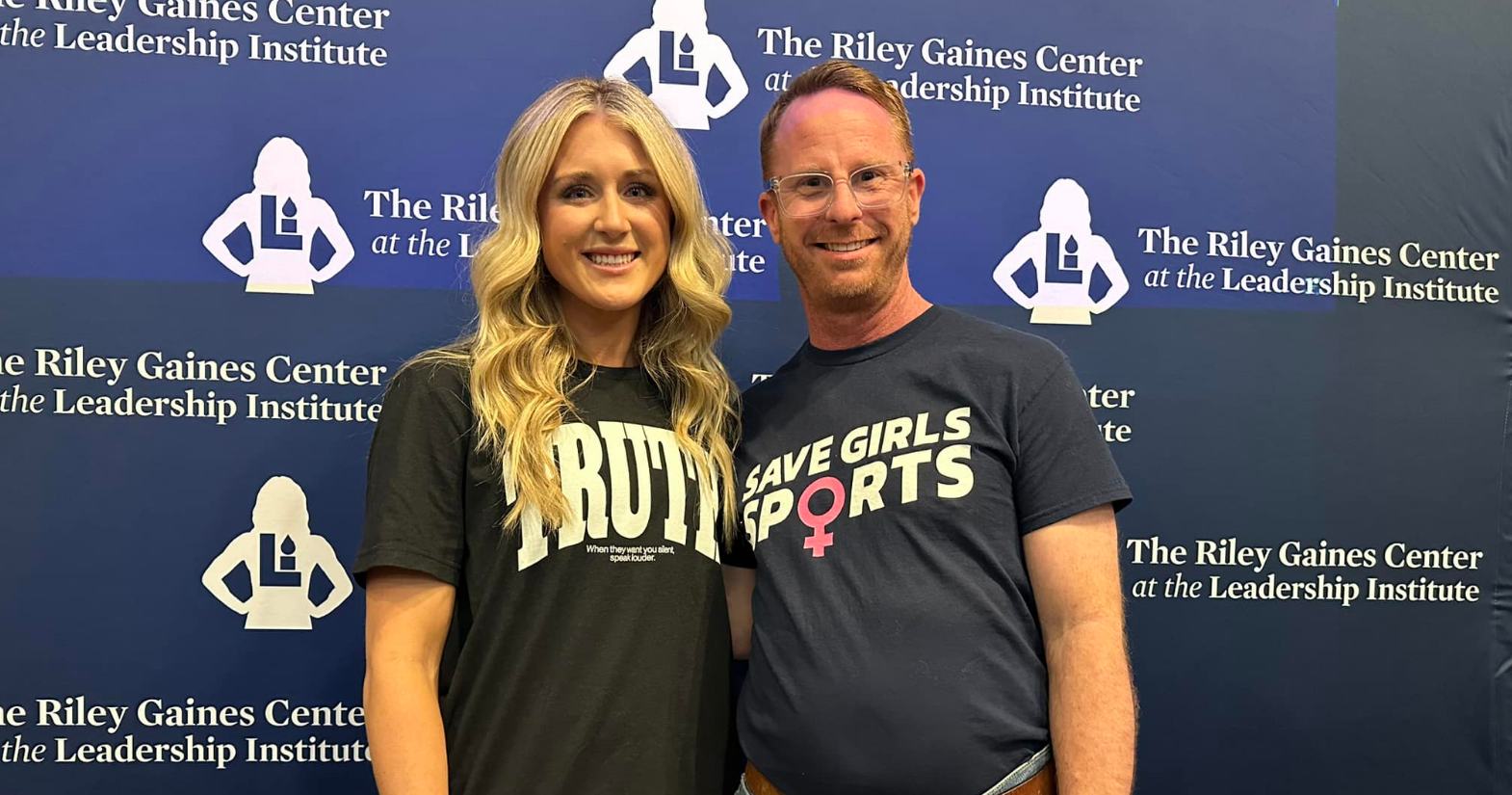
DENVER, Colo. – A lawsuit against five Colorado state lawmakers for alleging they unlawfully restricted or chilled speech in legislative hearings was filed in the U. S. District Court for the District of Colorado on Thursday, April 4. The suit was brought by the Institute for Free Speech on behalf of Gays Against Groomers and Rocky Mountain Women’s Network.
The lawsuit alleges that State Representatives Lorena Garcia, Mike Weissman, Leslie Herod, and State Senators Julie Gonzales and Dafna Michaelson Jenet as having unlawfully restricted or chilled speech related to trans issues, particularly as it pertains to debate over what its sponsors called “Tiara’s Law.”
The bill, HB24-1071 is informally referred to as Tiara’s Law, named for Tiara Latrice Kelley, a trans woman convicted of felonies related to being a sex worker. Tiara’s Law would ease the path to name changes on official documents for convicted felons.
Opponents charge that name changes can make it “far easier for felons to hide their criminal past and might make it easier for them to victimize children or other vulnerable populations.”
During recent hearings on the proposed law, Senator Gonzales who introduced HB23-1071 before the Colorado House Judiciary Committee warned other members and witnesses to refrain from using derogatory language or misgendering witnesses or using a trans witness’ deadname. Rep. Garcia urged speakers to engage in “respectful discourse.”
The Judiciary Committee Chair, Rep. Weissman then ruled that these specifications would be incorporated into the conduct of the hearing.
According to the court filing by Institute for Free Speech attorneys, Dr. Rich Guggenheim of the organization Gays Against Groomers abandoned his place in line at the hearing, “fearing his speech would be deemed non-conforming and censored.” The court documents also note that when Christina Goeke of the Rocky Mountain Women’s Network testified, when Goeke attempted to discuss Kelley’s criminal history and used Kelley’s legal name and male pronouns, she was repeatedly interrupted and ultimately had her testimony terminated by Chair Weissman.
The suit also alleges in a Senate Judiciary Committee, portions of Goeke’s testimony from the official audio record of its hearing on HB24-1071 was erased.
“Americans are having a debate about sex, gender, and pronouns. The First Amendment protects Americans’ right to express their views on those matters, even if those views might be offensive to some,” said Del Kolde, Senior Attorney at the Institute for Free Speech. “By forcing speakers to adopt a contested ideology, Colorado lawmakers unlawfully privileged one viewpoint over another and silenced dissent, going so far as to erase it from the public record.”
In January, the Anti-Defamation League released a report naming Gays Against Groomers, a group that “peddles dangerous and misleading narratives about the LGBTQ+ community,” among notable amplifiers of anti-LGBTQ rhetoric online.
The Southern Poverty Law Center in October published a report that stated:
In the year [2022] since its founding, Gays Against Groomers has established itself as one of the most notable propagators of anti-trans rhetoric, deploying QAnon conspiracy propaganda in its crusade to save children from transgender individuals who they claim are attempting to sexually groom children. The group also attacks those supporting gender-affirming care and the transgender community, labeling them pedophiles.
Related:
U.S. Federal Courts
D.C. gay gym owner pleads not guilty to distributing child porn
Everts has been held without bond since the time of his Nov. 29 arrest on a single charge of distribution of child pornography
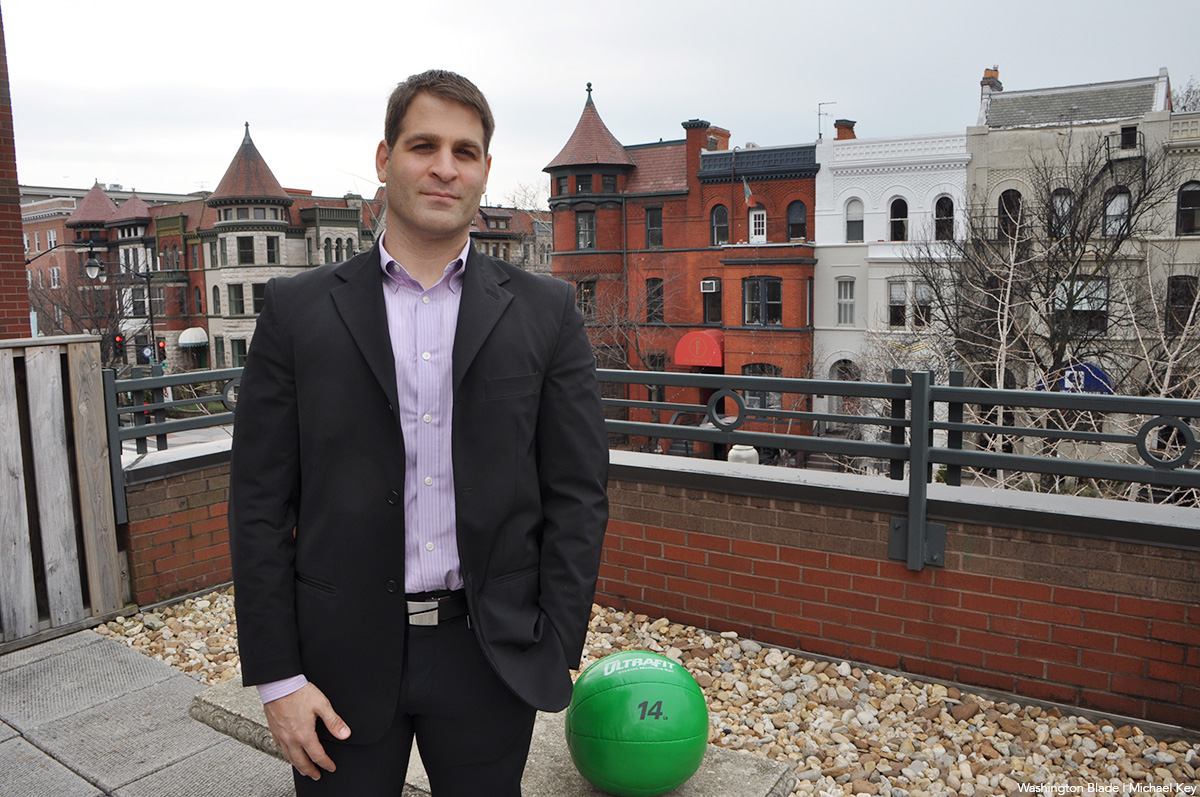
WASHINGTON – Gay D.C. gym owner Michael Everts, who was arrested Nov. 29, 2023, on a charge of distributing child pornography, pleaded not guilty on Thursday, April 4, at his arraignment hearing in U.S. District Court for the District of Columbia.
At the request of Everts’s defense attorney and the lead prosecutor with the Office of the U.S. Attorney for D.C., U.S. District Court Judge Tanya S. Chutkan agreed to give Everts more time to consider whether to accept an offer by prosecutors to plead guilty to a lower charge that would avoid bringing the case to trial.
Chutkan scheduled a status hearing for 9 a.m. on June 10 at which time the two parties were expected to disclose whether a plea agreement was reached or whether the case would go forward for a trial.
News that a plea bargain offer was in the works surfaced in January when the U.S. Attorney’s office and Everts’s defense attorney filed a joint motion asking another judge presiding over the case at that time to postpone a preliminary hearing and arraignment for Everts on grounds that prosecutors were about to issue a plea offer and the two sides needed more time to discuss the offer.
Everts has been held without bond since the time of his Nov. 29 arrest on a single charge of distribution of child pornography following a joint D.C. police-FBI investigation that led to his arrest. Chutkan ordered that Everts remain in custody until at least the time of the June status hearing.
He was escorted into the courtroom at Thursday’s arraignment wearing an orange prison jumpsuit. In response to questions by the judge, he said he understood he is being charged with a single count of distribution of child pornography and is entitled to a full trial by jury if he chooses a trial rather than accept a plea offer by prosecutors.
Everts has owned and operated the FIT Personal Training gym located at 1633 Q St., N.W., near Dupont Circle since its opening in 2002.
The lead prosecutor in the case, Assistant U.S. Attorney Jocelyn Bond, on Dec. 1 filed a 20-page Memorandum in Support of Pretrial Detention for Everts, which the judge approved. The memorandum provides details of the investigation and its findings that prosecutors say showed that Everts distributed images of underage boys engaging in sexual acts to an undercover D.C. police detective posing in an online gay hookup site as someone interested in underage boys for sex.
According to the prosecutors’ memo, Everts allegedly sent the undercover officer video and photo images of child pornography. The memo and a separate police-FBI affidavit in support of Everts’s arrest state that the investigation found, through information from a tipster, that Everts was exchanging messages on a gay sex hookup site expressing interest in exchanging images of underage boys for sexual gratification. That information prompted the joint D.C. police-FBI sting operation that led to Everts’s arrest.
Under the criminal statute Everts is charged with – distribution of child pornography – those convicted of that charge face a mandatory minimum sentence of five years in prison and a possible maximum sentence of 20 years in prison. Aside from a prison sentence an individual convicted of this charge must register as a sex offender for life.
David Benowitz, Everts’s defense attorney, when approached by the Washington Blade following Thursday’s arraignment, said he would consider a request by the Blade for comment on the case and whether he or Everts dispute any of the allegations against Everts brought by prosecutors.
U.S. Federal Courts
Trailblazing out wrestler sentenced to 7+ years prison for child porn
Donovan was found to have exchanged “multiple images & videos of child sexual abuse, including depictions involving pre-pubescent children”

TRENTON, N.J. — New Jersey’s U.S. Attorney announced the sentencing of wrestling coach Alec Donovan, 26, following his guilty plea to distributing child pornography, including the sharing of nude selfies with minors.
On Thursday, U.S. District Judge Zahid N. Quraishi sentenced Donovan to 87 months — more than seven years — and added 30 years of supervised release.
Donovan’s imprisonment is not the first time he’s made headlines. In 2015, the Brick Township man was a high school senior who was crowned state wrestling champion, with a 39-1 record, ranked among the top 25 wrestlers in the nation for his weight class.
That same year, Donovan came out publicly as gay in an interview with an LGBTQ sports website, detailing how he came out to a female friend in freshman year at Brick Memorial High School and to fellow wrestlers in his junior year. He had considered suicide, and found acceptance.
Donovan went on to even greater fame as the first known out gay wrestler in NCAA history.
But in college, after experiencing homophobia and losing his scholarship following a concussion, he transferred to Centenary University in Hackettstown and graduated with a bachelor’s degree in history.
According to Donovan’s LinkedIn page, he worked as a coach at the Shore Thing Wrestling Club in Lakewood, N.J. as well as a supervisor for TDI, Inc. and as a wedding photographer.
The news release issued on March 29 by U.S. Attorney Philip Sellinger states that “Donovan used an internet-based application to exchange multiple images and videos of child sexual abuse, including depictions involving pre-pubescent children,” from January 2021 through March 2021. The prosecutor said Donovan also “used the web-based messaging application to solicit and engage in conversations with minors, including requesting nude photographs from the minors and sending nude photographs to them.”
Donovan’s arrest was the result of work by the Newark Child Exploitation and Human Trafficking Task force, under the direction of FBI Special Agent in Charge James E. Dennehy in Newark, N.J.
U.S. Federal Courts
Two indicted for supplying fentanyl causing death of Cecilia Gentili
New York City residents Michael Kuilan & Antonio Vent were named in court documents which laid out the events leading to the death of Gentili
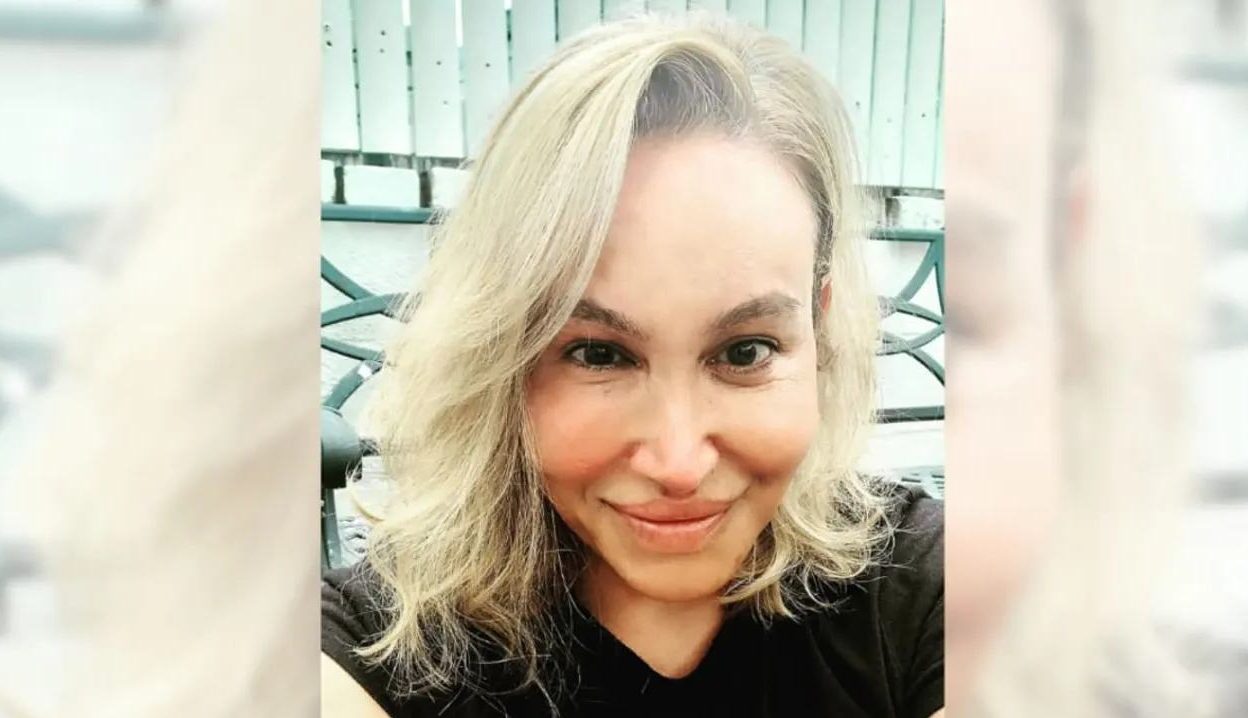
BROOKLYN, N.Y. – On Monday, Breon Peace, United States Attorney for the Eastern District of New York announced that two men had been charged with distributing the heroin and fentanyl that caused the death of 52-year-old Argentina-born Cecilia Gentili, a beloved prominent New York trans activist.
New York City residents Michael Kuilan and Antonio Vent were named in the court documents which laid out the events leading to the death of Gentili.
According to the indictment and court documents, on February 6, 2024, following a 911 call by Gentili’s partner, NYPD officers reported to Gentili’s home in Brooklyn, New York and found Gentili dead in her bedroom. Gentili died due to the combined effect of fentanyl, heroin, xylazine, and cocaine. Text messages, cell site data, and other evidence revealed that Venti sold the fentanyl and heroin mixture to Gentili on February 5, 2024, and Kuilan supplied Venti with those lethal narcotics.
In addition, law enforcement searched an apartment in Williamsburg, Brooklyn belonging to Kuilan and found hundreds of baggies of fentanyl, a handgun, and ammunition.
“Cecilia Gentili, a prominent activist and leader of the New York transgender community was tragically poisoned in her Brooklyn home from fentanyl-laced heroin. Today, the alleged perpetrators who sold the deadly dose of drugs to Gentili have been arrested,” stated United States Attorney Peace. “Fentanyl is a public health crisis. Our Office will spare no effort in the pursuit of justice for the many New Yorkers who have lost loved ones due to this lethal drug.”
“Today’s indictment delivers a strong message to anyone who profits from poisoning our communities with illicit drugs: There are dedicated investigators, across multiple agencies, working tirelessly to disrupt your shameful industry by pinpointing the source of these unlawful substances,” stated NYPD Commissioner Caban. “It is imperative that we continue to hold distributors accountable for their callous actions. I commend the NYPD’s partners at the DEA and the office of the U.S. Attorney for the Eastern District of New York for their ongoing commitment to this critical mission.”
An undocumented immigrant and then asylum seeker from Argentina, Gentili came to the United States pursuing a safer life to live authentically as a transgender woman. She lived undocumented for 10 years, hustling doing sex work which came with drug use. After surviving arrests and an immigration detention, she accessed recovery services and won asylum.
Among Gentili’s accomplishments was her work as a co-founder of her namesake COIN Clinic (Cecilia’s Occupational Inclusion Network ) at Callen-Lorde, a New York City-based leader in LGBTQ+ healthcare. She later was the managing director of policy for the world-renowned GMHC (originally the Gay Men’s Health Crisis).
-

 West Hollywood3 days ago
West Hollywood3 days agoDavid Cooley makes emotional exit as owner of The Abbey WeHo
-

 Politics4 days ago
Politics4 days agoFirst Lady warns Trump is ‘dangerous to the LGBTQ community’
-

 Los Angeles4 days ago
Los Angeles4 days ago24-year-old trans Latina Angeleno & makeup artist shot to death
-

 Political commentary & analysis3 days ago
Political commentary & analysis3 days agoJimmy Kimmel Live’s hilarious faux ‘Out for Biden’ campaign ad
-

 West Hollywood2 days ago
West Hollywood2 days agoOut stylist found beaten outside Heart WeHo nightclub recovering
-

 Colorado3 days ago
Colorado3 days agoTransgender, nonbinary ICE detainees allege mistreatment at Colo. detention center
-

 Events4 days ago
Events4 days agoCynthia Erivo to be honored at LA LGBT Center Gala
-

 Los Angeles County4 days ago
Los Angeles County4 days agoCity of Malibu backing two bills aimed at making PCH safer
-

 South America5 days ago
South America5 days agoConvicted killer in Daniel Zamudio murder in Chile seeks parole
-

 West Hollywood2 days ago
West Hollywood2 days agoVinson is leading riders in 2024 WeHo Pride & Dyke march



